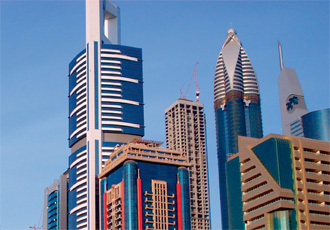
GCC economies immune to oil price shock
(MENAFN- Khaleej Times) Gulf economies continue to have substantial buffers to cover lower crude price: imf
The international monetary fund (imf) has said that most gcc economies continue to have “substantial buffers” to cope with short-lived oil price shocks despite an expected drop in their current account surpluses.
In its world economic outlook published ahead of its spring conference in washington the imf said economic growth in most of the gcc economies is to hover near the rates registered in 2013 with saudi arabia the largest arab economy expanding by 4.1 per cent in 2014 compared to 3.8 per cent in 2013.
The right to host world expo 2020 in dubai has strengthened growth prospects of the uae the imf said. — supplied photo
The uae the second largest arab economy is to grow by 4.4 per cent an upward revision compared with imf’s estimate of 3.9 per cent in october. “in the uae where real estate prices are rising at a fast pace the award of world expo 2020 has further strengthened growth prospects” the imf said. inflation in the uae is forecast to be 2.2 per cent this year compared to 1.1 per cent last year as a drastic rise in rents in dubai and abu dhabi have triggered inflationary pressures.
The fund also raised gdp forecasts for qatar to 5.9 per cent from five per cent. kuwait’s economy will grow 2.6 per cent this year and three per cent in 2015 after growing by just 0.8 per cent last year.
The imf cautioned that a rapid growth in us oil production combined with potentially weaker global demand posed a downside risk to gulf oil output and prices. us oil output has been rising fast on the back of the newly-tapped shale-based reserves.
Opec said last month that supply from non-members is expected to increase by 1.31 million barrels per day this year mainly from the united states canada and brazil.
“falling oil revenues are already causing fiscal surpluses to decline to 2.6 per cent in 2014 despite withdrawal of the fiscal stimulus initiated by many countries during the global recession and the arab spring. large current account surpluses are also expected to decline because of lower oil revenues. although fiscal positions have been weakening across the gcc economies over the past several years most still have substantial buffers to withstand large shocks to oil prices provided the shocks are short lived” the imf said.
“policy priorities continue to be centred on diversifying these economies to reduce dependence on oil increase employment opportunities in the private sector for nationals and enhance resilience to shocks” the imf said.
In the middle east and north africa afghanistan and pakistan (menap) economic activity will strengthen in 2014–15 as export growth improves in line with trading partners’ recoveries and public and private investment accelerates following tepid growth in 2013. despite the improved outlook weak confidence high unemployment low competitiveness and in many cases large public deficits will continue to weigh on economic prospects in the region.
— issacjohn?khaleejtimes.com

Legal Disclaimer:
MENAFN provides the
information “as is” without warranty of any kind. We do not accept
any responsibility or liability for the accuracy, content, images,
videos, licenses, completeness, legality, or reliability of the information
contained in this article. If you have any complaints or copyright
issues related to this article, kindly contact the provider above.


















Comments
No comment